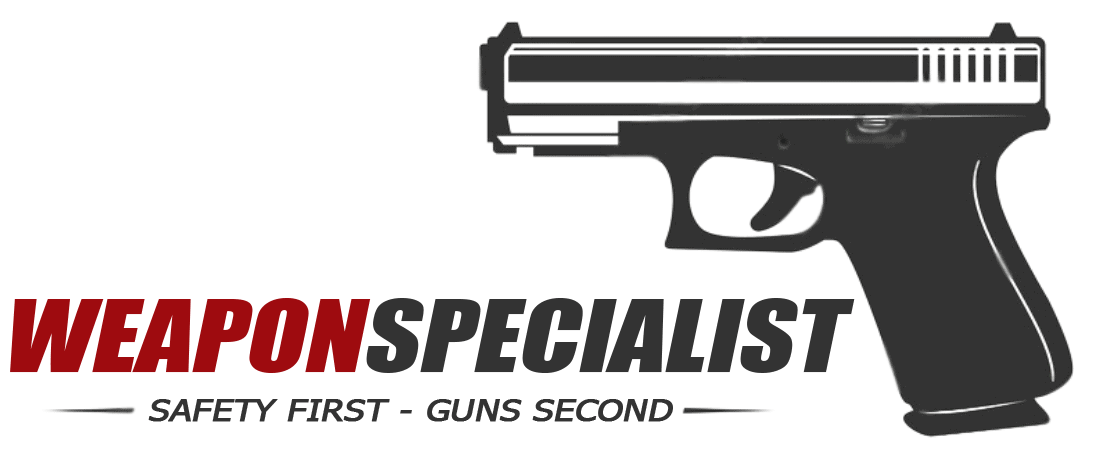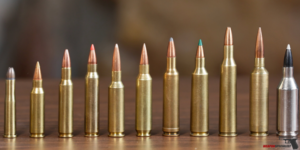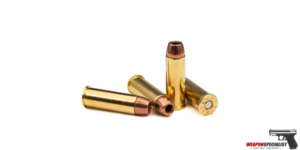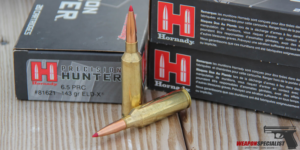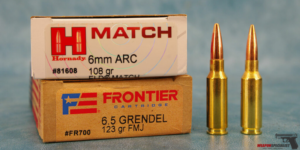When delving into the world of firearms and ammunition, the ongoing debate of “10mm vs 9mm” stands as a central point of discussion among enthusiasts and professionals alike. Both rounds have earned their place in the realm of handguns, each with its own set of advantages and trade-offs.
As I explore the nuances of these two popular calibers, I unravel the intricacies that have sparked numerous conversations regarding stopping power, recoil management, magazine capacity, and overall performance.
What is 10mm Bullet?
10 mm Bullet is a type of ammunition used in handguns and rifles. It is usually seen in semi-automatic firearms, though it can be found in lever action and bolt action weapons as well. 10mm bullet cartridges are relatively modern and were developed for law enforcement use back in the 1980s.
The 10mm caliber was designed by U.S. Arms maker Smith & Wesson to compete with the .357 Magnum round, although it has since become popular among civilians as well.
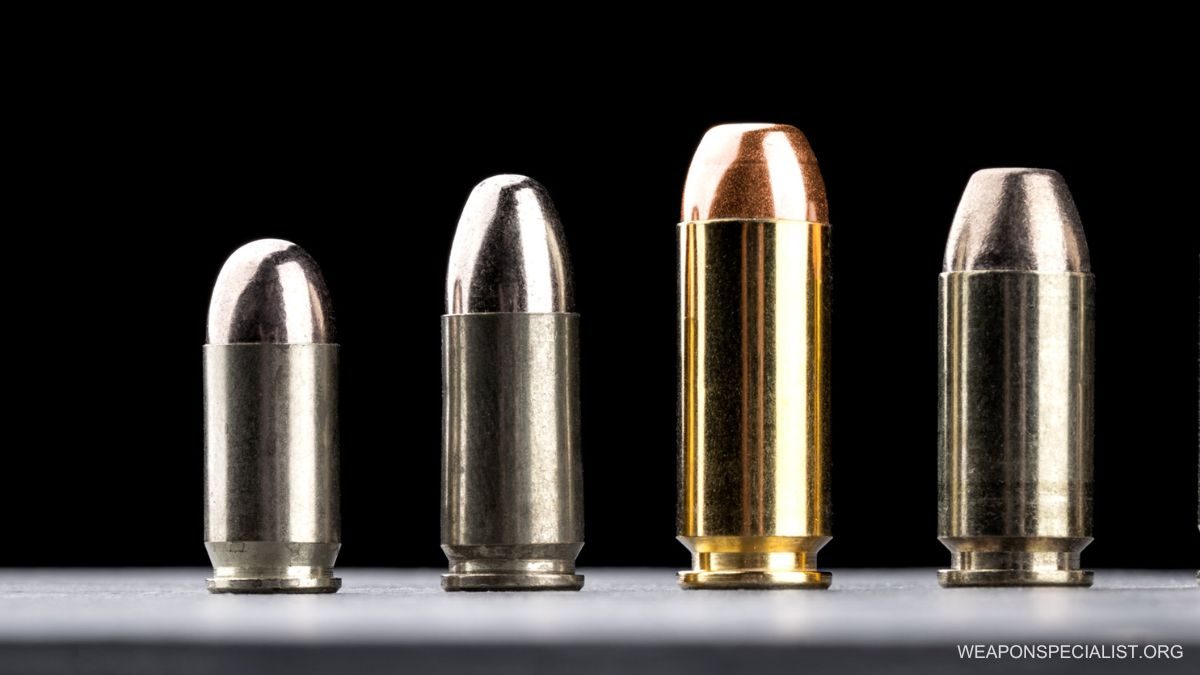
Although the .40 S&W has become more common due to its lower recoil and wider availability, some users prefer the power of the 10mm bullet for hunting or self defense applications.
Compared to other handgun calibers like 9x19mm (9mm Parabellum) and .45 ACP, the 10mm bullet packs more of a punch. It has greater muzzle energy and can often penetrate tougher targets better than smaller calibers.
However, this added power also comes with increased recoil that may be too much for some shooters to handle comfortably. Additionally, due to its size, 10mm ammo is not as widely available or inexpensive as other cartridges like 9x19mm or .45 ACP.
- Powerful: The 10mm cartridge is known for its significant stopping power, making it effective for self-defense and hunting applications. It offers better terminal ballistics compared to smaller handgun calibers.
- Versatile: The 10mm can be used for a variety of purposes, including self-defense, hunting, and competition shooting. Its versatility makes it a good choice for those who want a single firearm for multiple uses.
- Accuracy: Many shooters find the 10mm to be accurate at longer ranges, which can be advantageous for hunting or target shooting.
- Adequate Magazine Capacity: Many semi-automatic handguns chambered in 10mm have reasonable magazine capacities, allowing for more rounds compared to some larger caliber handguns.
- Effective for Hunting: The 10mm is a popular choice for handgun hunting due to its ability to deliver sufficient energy and accuracy for taking down medium-sized game.
- Recoil: The 10mm generates substantial recoil, which can be challenging for some shooters to manage, particularly those with less experience or weaker hand strength.
- Ammunition Cost: 10mm ammunition tends to be more expensive than common handgun calibers like 9mm or .40 S&W, making it less budget-friendly for regular practice.
- Limited Firearm Choices: While there are several firearm options available in 10mm, the selection is more limited compared to more common calibers, which can make finding the right firearm for your needs more challenging.
- Over-Penetration: Due to its power, the 10mm can over-penetrate soft targets, potentially posing a risk to bystanders. Shooters need to be cautious of their surroundings.
- Muzzle Blast and Flash: Some 10mm loads produce significant muzzle blast and flash, which can affect follow-up shots and may be unpleasant for the shooter.
- Limited Availability: In some areas, 10mm ammunition and firearms may be less readily available compared to more mainstream calibers.
What is 9mm Bullet?
A 9 mm bullet is a type of ammunition typically used in pistols and submachine guns. It is the most popular pistol round in the world, due to its relatively low cost, wide availability and being relatively easy to control while shooting.
Commonly referred to as “nine mil” or “9mm Parabellum” (the original military designation for this caliber), it has become one of the most widely used rounds for personal self-defense, police work, and military operations. The term “Parabellum” comes from Latin meaning “for war.”
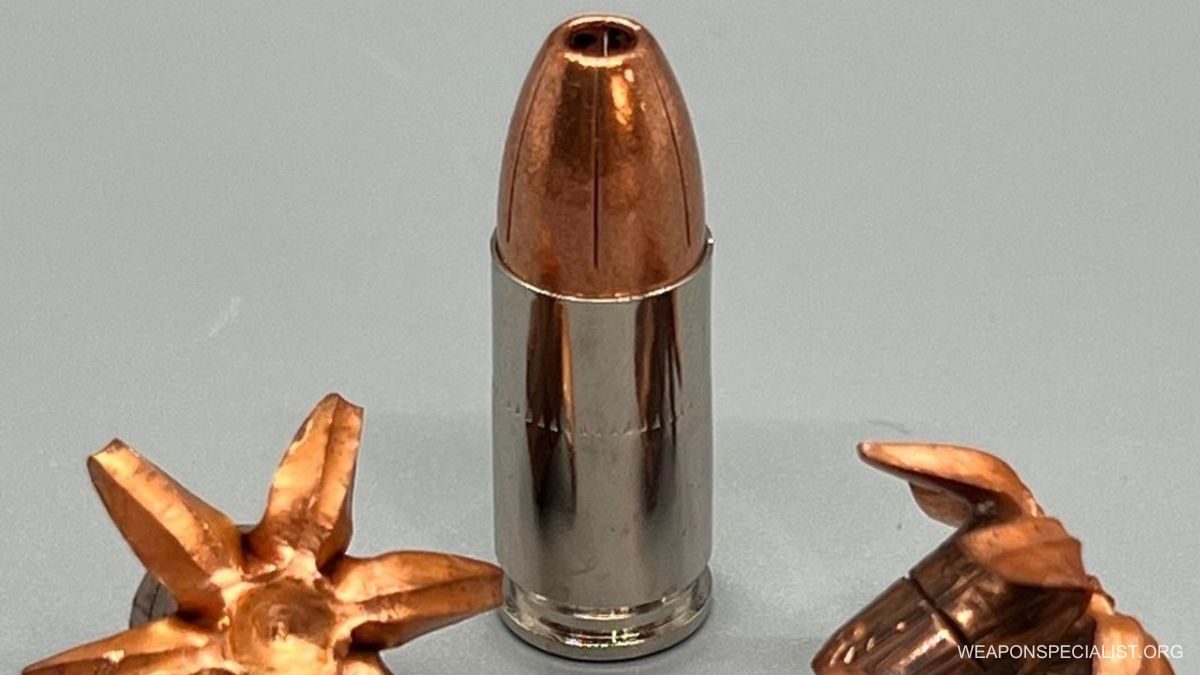
The 9mm bullet typically consists of a copper jacket surrounding a lead core. Its size allows for higher magazine capacities than larger calibers such as the .45 ACP. The bullet is also designed to expand once it hits its target, and this aids in creating more wound trauma than a standard FMJ (full metal jacket) round.
The 9mm Parabellum has been around since 1901 when it was first adopted by the German Army. Over the years, the design of the round has evolved to improve its performance.
Modern versions of this caliber have improved accuracy, reliability and muzzle velocity over earlier models. It remains one of the most popular calibers used today due to its versatility and effectiveness as a defensive cartridge.
- Availability: 9mm ammunition is widely available and is produced by numerous manufacturers. This makes it easier to find and purchase, especially during times of high demand.
- Affordability: Generally, 9mm ammunition tends to be more affordable than some other handgun cartridges, making it cost-effective for training and practice.
- Capacity: Firearms chambered in 9mm often have higher magazine capacities compared to larger-caliber handguns. This can be advantageous in self-defense or competition shooting situations.
- Manageable Recoil: The 9mm cartridge typically generates less recoil than larger calibers like .40 S&W or .45 ACP. This makes it more manageable for shooters of varying skill levels, particularly for follow-up shots and rapid fire.
- Adequate Stopping Power: While it may not have the stopping power of larger caliber rounds, modern 9mm ammunition with advanced bullet designs can still be effective for self-defense purposes.
- Military and Police Adoption: Many military and law enforcement agencies around the world use handguns chambered in 9mm. This standardization can lead to broader support and compatibility.
- Stopping Power: While effective, the 9mm cartridge is often considered to have less stopping power compared to larger calibers like .40 S&W or .45 ACP. This can be a disadvantage in some self-defense scenarios.
- Range and Accuracy: At longer distances, the 9mm’s trajectory and accuracy can be less than ideal compared to higher-velocity calibers.
- Penetration Concerns: Due to its relatively high velocity, 9mm rounds can potentially over-penetrate, posing a risk of hitting unintended targets in self-defense situations.
- Recoil Sensitivity: While 9mm has less recoil compared to larger calibers, some individuals may still find it uncomfortable or difficult to manage.
- Dependent on Ammunition Quality: The effectiveness of the 9mm cartridge can vary significantly depending on the quality and design of the ammunition used. Not all 9mm ammo is created equal.
- Lack of Variety: While 9mm is versatile, it may not offer the same level of specialization as other calibers for specific tasks, such as hunting or competition shooting.
Quick 10mm vs 9mm Comparison Table
| Characteristic | 9mm | 10mm |
|---|---|---|
| Bullet Diameter | 9.01mm | 10.16mm |
| Bullet Weight | 115-147 grains | 135-200 grains |
| Muzzle Velocity | 950-1,400 fps | 1,150-1,400 fps |
| Muzzle Energy | 300-500 ft-lbs | 500-750 ft-lbs |
| Recoil | Moderate | Strong |
| Typical Use | Self-defense, law enforcement | Hunting, self-defense |
| Popular Firearms | Glock 17, Sig Sauer P226, Beretta 92 | Glock 20, Colt Delta Elite, Smith & Wesson Model 610 |
10mm vs 9mm Ballistic Performance
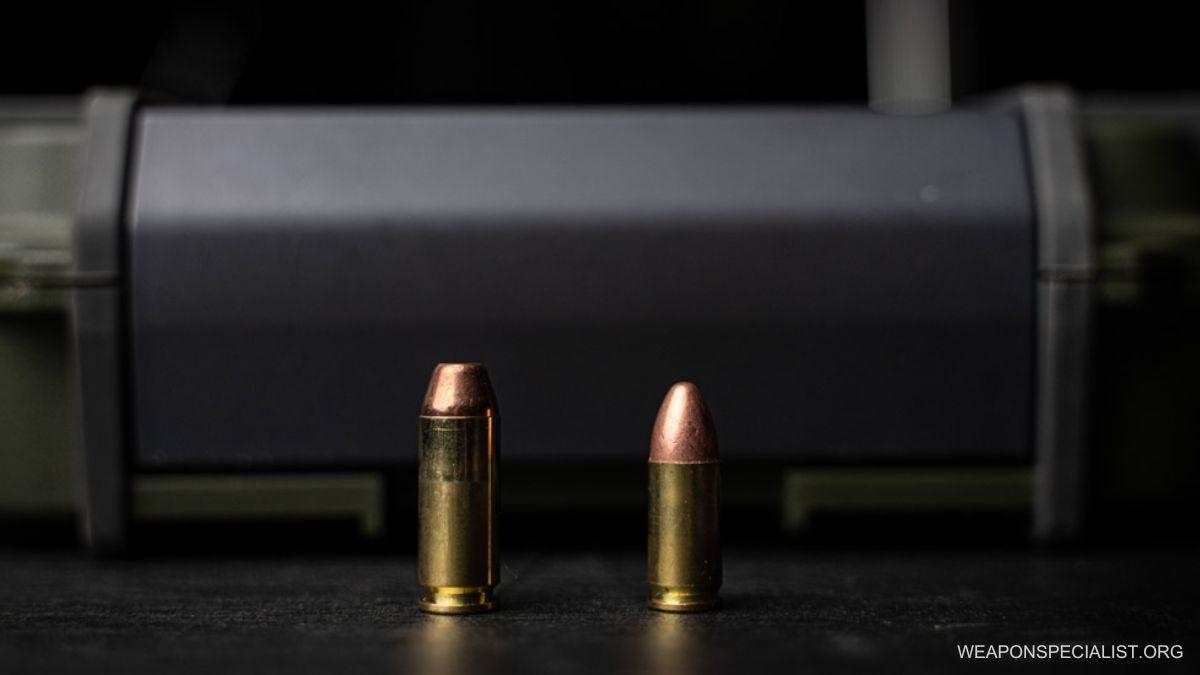
Penetration
When it comes to penetration, the 10mm has a clear advantage over the 9mm. The larger and heavier 10mm bullet is able to penetrate deeper into targets than the smaller and lighter 9mm bullet.
In fact, the 10mm has been known to penetrate through car doors, walls, and other barriers that the 9mm cannot. This makes the 10mm a better choice for those who may need to shoot through obstacles to reach their target.
Stopping Power
Stopping power is a measure of a bullet’s ability to incapacitate a target. While both the 10mm and the 9mm are capable of stopping an attacker, the 10mm has an edge in this category as well.
The larger and heavier 10mm bullet delivers more energy to the target upon impact, which can result in faster incapacitation. However, it’s important to note that shot placement is still the most important factor in stopping an attacker, regardless of the caliber of the bullet.
Overall, the 10mm has better ballistic performance than the 9mm in terms of penetration and stopping power. However, it’s important to consider other factors such as recoil, ammunition availability, and personal preference when choosing between the two calibers.
10mm vs 9mm Accuracy and Recoil
When it comes to choosing between 10mm and 9mm handguns, accuracy and recoil are two important factors to consider. While 10mm handguns are known for their power, they can be more difficult to control than 9mm handguns.
Recoil Control
Recoil control is a crucial aspect of accuracy, as it can affect the shooter’s ability to aim and follow up with shots. According to AllOutdoor.com, a 10mm Auto load with a 175 grain Silvertip HP generates 649 ft. lbs. of muzzle energy, which is 200 more ft. lbs. than a typical 9mm load. This means that 10mm handguns are likely to have more recoil than 9mm handguns.
However, as Sharpshooter Society notes, 10mm handguns are generally larger and heavier than 9mm handguns, which can help to mitigate recoil. Additionally, some 10mm handguns have adjustable recoil systems that allow the shooter to customize the amount of recoil they experience.
Accuracy at Different Distances
Another important factor to consider when comparing 10mm and 9mm handguns is accuracy at different distances. According to Field & Stream, the 10mm G29 has almost 10 foot-pounds of recoil, while the 9mm G26 has about 40 percent less recoil. This makes the 9mm handgun more comfortable to shoot, which can lead to better accuracy.
However, as RECOIL notes, the 10mm handgun has the advantage when it comes to accuracy at longer distances. This is due to the fact that 10mm rounds typically have a flatter trajectory and retain more energy at longer ranges than 9mm rounds.
Overall, when it comes to accuracy and recoil, both 10mm and 9mm handguns have their strengths and weaknesses. Shooters should consider their individual needs and preferences when choosing between the two.
10mm vs 9mm Ammunition Availability and Cost
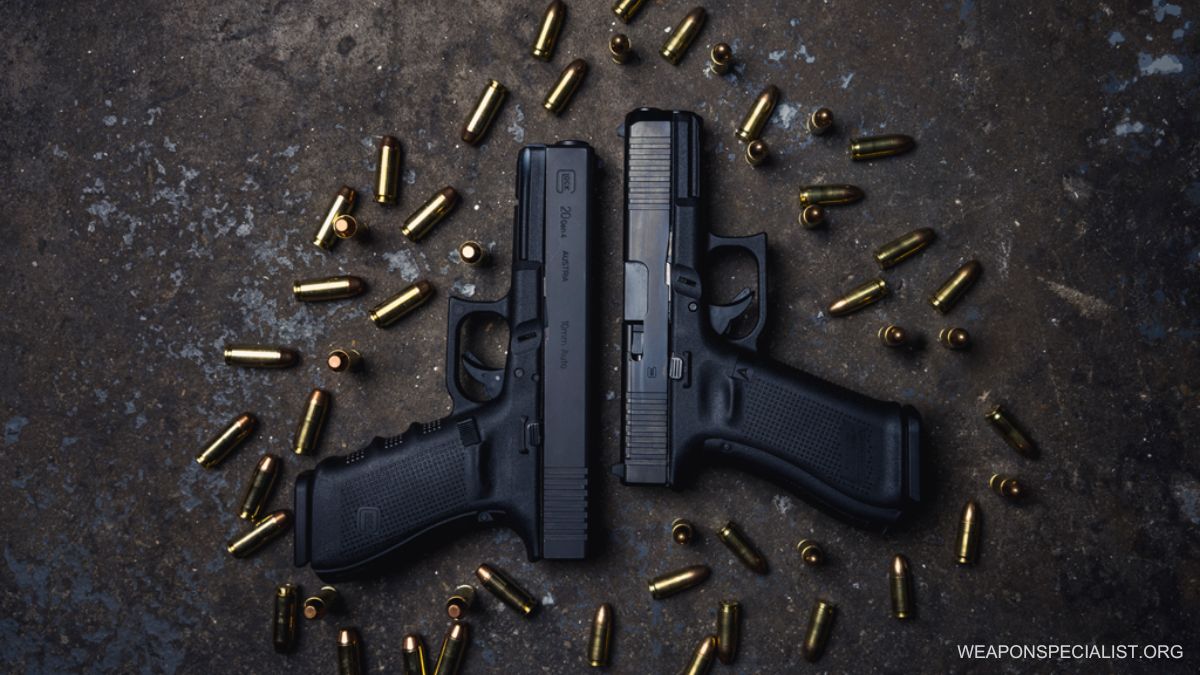
Price Comparison
When it comes to comparing the price of 9mm and 10mm ammunition, there are a few things to consider. At the time of writing, 9mm ammunition can be found for as cheap as $0.40 per round for FMJ and around $1 per round for personal defense JHP like Hornady 124 gr XTP or Winchester 115 gr Silvertip.
On the other hand, 10mm rounds go for about $0.85 per round on average. That’s not a significant difference, but it can add up if you shoot frequently or in large quantities.
It’s worth noting that the price of ammunition can fluctuate dramatically based on factors such as the manufacturer, the caliber type, and the availability of ammunition. For instance, some premium self-defense rounds can cost upwards of $2 per round, regardless of the caliber.
Availability
The availability of ammunition is another factor to consider. While 9mm ammunition is the most popular centerfire handgun cartridge in the world, it can still be challenging to find in times of high demand or low supply. However, it is generally more available than 10mm ammunition, which is a less common caliber.
According to BulkMunitions, 10mm has consistently been between $0.40 and $0.90 per round, whereas most pricing for 9mm has ranged from $0.20 per round to just over $0.70 per round. This can make 10mm more expensive when buying in bulk, which is something to keep in mind if you’re planning on doing a lot of shooting.
Ultimately, the availability and cost of ammunition can vary significantly based on a variety of factors. It’s essential to do your research and shop around to find the best deals on the caliber and type of ammunition you need.
10mm vs 9mm Personal Preference and Shooting Experience
Ergonomics
When it comes to personal preference, ergonomics play a crucial role in deciding which caliber to choose. Some people prefer the feel of a 9mm in their hand, while others prefer the larger grip of a 10mm.
It is important to choose a gun that feels comfortable and natural to hold, as this can greatly affect accuracy and overall shooting experience.
Training
Another factor that can influence personal preference is training. If someone has trained extensively with a 9mm and is comfortable with the recoil and handling of the gun, they may prefer to stick with that caliber.
On the other hand, if someone has trained with a 10mm and is comfortable with the added power and recoil, they may prefer that caliber instead.
Familiarity
Finally, familiarity can also play a role in personal preference. If someone has been shooting a certain caliber for years and is used to the way it feels and handles, they may be hesitant to switch to a different caliber. In this case, it may be best to stick with what is familiar and comfortable.
10mm vs 9mm FAQs
Q: What is the difference between 10mm and 9mm?
A: The main difference between 10mm and 9mm is their size and power. The 10mm is a larger cartridge, with a bullet diameter of 0.4 inches (10mm), while the 9mm has a bullet diameter of 0.355 inches (9mm). The 10mm also has more power, generating higher muzzle energy and velocity than the 9mm.
Q: Is a 10mm more powerful than a 9mm?
A: Yes, the 10mm is generally more powerful than the 9mm. The 10mm cartridge generates more muzzle energy and velocity than the 9mm, making it a more powerful round. However, this increased power comes at the cost of increased recoil, which can make the 10mm more difficult to shoot accurately.
Q: Which is better for self-defense, 10mm or 9mm?
A: Both the 10mm and 9mm can be effective for self-defense, but the choice ultimately depends on personal preference, shooting ability, and specific needs.
The 10mm has more power and can be better for stopping an attacker, but it also has more recoil and can be harder to shoot accurately.
The 9mm is more popular and widely available, and its lower recoil can make it easier to shoot accurately and quickly for follow-up shots.
Q: Is the 10mm more expensive than the 9mm?
A: Generally, yes, the 10mm is more expensive than the 9mm. This is because the 10mm cartridge uses more materials and has a larger bullet diameter, which makes it more expensive to manufacture.
Additionally, because the 9mm is more popular and widely used, it is often produced in larger quantities and can be purchased for a lower price.
Q: What guns can shoot 10mm and 9mm?
A: Many handguns can shoot both 10mm and 9mm, but it depends on the specific make and model of the firearm. Some popular handguns that can shoot both rounds include the Glock 20, the Sig Sauer P220, and the CZ 75. However, it’s important to note that while some guns can shoot both rounds, they may require different magazines or barrels to do so.
Q: Is the 10mm more accurate than the 9mm?
A: Accuracy depends on a variety of factors, including the shooter’s ability, the firearm’s design, and the ammunition used. Generally, the 9mm may be easier to shoot accurately due to its lower recoil and smaller size, but some shooters may find the larger size and power of the 10mm to be more manageable and accurate.
Q: Which has more stopping power, 10mm or 9mm?
A: The 10mm generally has more stopping power than the 9mm due to its larger size and higher velocity. However, the effectiveness of either round in stopping an attacker ultimately depends on a variety of factors, including shot placement, bullet design, and the attacker’s physical condition.
Q: Can the 10mm and 9mm be used for hunting?
A: Yes, both the 10mm and 9mm can be used for hunting, although the 10mm is generally preferred for larger game due to its higher power.
However, many states have regulations regarding the minimum caliber or muzzle energy required for hunting certain types of game, so it’s important to check local hunting regulations before using either round for hunting.
Q: What are some advantages of the 9mm over the 10mm?
A: Some advantages of the 9mm over the 10mm include its smaller size and lower recoil, which can make it easier to shoot accurately and quickly for follow-up shots. Additionally, the 9mm is more widely available and less expensive than the 10mm, which can make it more practical for some shooters.
Q: What are some advantages of the 10mm over the 9mm?
A: Some advantages of the 10mm over the 9mm include its larger size and higher power, which can make it more effective for stopping an attacker or hunting larger game. Additionally, the 10mm may be preferred by some shooters who prefer a larger firearm or who can handle the increased recoil.
Conlusion
In conclusion, the 9mm and 10mm are both powerful calibers that have their own advantages and disadvantages. The 9mm is smaller and lighter, making it easier to carry and conceal.
It also has less recoil, making it easier to shoot accurately. However, the 10mm has more stopping power and can be used for hunting or self-defense against larger animals. Ultimately, the best caliber for you will depend on your individual needs and preferences.
Last Updated on November 21, 2023 by
